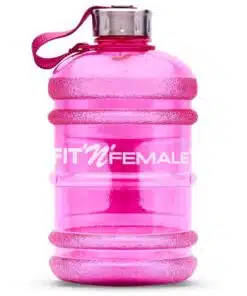The wrong Nutrition slows you down. Eating right is critical because you need it to support your athletic activities. The following six pillars of a successful fitness diet are the foundation for your success.
It's a golden rule for any fitness program or lifestyle: nutrition is king. If you recover poorly between workouts, it's probably your food's fault. If your muscles fatigue during a workout, everything is normal. However, if you wake up the next morning and feel like you're beat, you won't have eaten the right foods. All your training efforts will be in vain if you don't eat properly. Progress will not occur and your body will be damaged. There is a risk of kidney weaknesses, hormonal imbalances, injuries, or whatever other dysfunctions. If a world-famous high-performance athlete - for example, an Olympic weightlifting champion - did not consume suitable food, he would never have achieved such success. You don't have to achieve such feats, but by balancing training and nutrition, you have a chance to reach your full potential.
1. achieve balance
Are you having chicken and broccoli for dinner again? You don't have to contort yourself and eat the same thing all the time to lose that pesky fat tissue. You can always achieve your dream body if you stick to a nutrient-dense diet 80 to 90 percent of the time and treat yourself once in a while. When you go out to eat at a restaurant, you don't have to nibble on a lettuce leaf all evening. Everyday nutrition is key. Eating out on dates and at parties tends to be the exception. If you stick to your meal plan 80 to 90 percent of the time, you can freely choose the remaining 10 to 20 percent of your food according to your mood. This is psychologically very important because it makes you strong. Thanks to this relatively small amount of food, you'll stay on the ball even when training and fitness nutrition bring you to the brink of giving up or cheating. The anticipation of your favorite foods will keep you going. Since you won't get any nutritional runaways, you'll reap better results throughout the year.
If you restrict yourself too much, you can end up with metabolic deficits - sometimes permanent ones. This is especially true for people who want to reach a single-digit body fat percentage and are therefore too hard on themselves. Restricting yourself too much is a big mistake that will not only deprive you of a balanced diet. Your quality of life and vitality will suffer. Some top athletes made the same mistakes. They were obsessed and totally focused on calories, fats, carbohydrates, protein, and other healthy nutrients and minerals. As a result, they allowed themselves so few different foods that they could count them on one hand. At some point, they changed their behavior and found a workable way that satisfied both body and mind. From then on, they allowed themselves their favorite foods and it worked. Your psyche is absolutely crucial, because your mind only wants to protect you. If you help it, you help yourself. Reprogram it. If you treat yourself to delicious food on a regular basis, your mind will not oppose it. Instead, it will motivate you to stick with the fitness program and the diet. After all, the reward is already waiting for you. To learn and store new behaviors, your mind needs about 21 days. So the reprogramming phase is not too long. After that, this way will seem completely normal to you and will "go into your blood".
2. be realistic and know yourself
You must always be honest and realistic with yourself. This is especially true for your body's limits. You need to know when to say no or stop. This will help you develop and learn the finer points of fitness-focused nutrition. However, if you choose a diet that is hard to stick with, it won't do you any good in the long run. If you want to have lasting success, your nutrition strategy must be adapted to your needs. You too may find that a balanced approach with a variety of different foods is the right path for you. It's not something you can do overnight. Don't break the bank and your mind will rebel. Realism means setting small and achievable goals. Take it one step at a time and don't change your diet abruptly. If you like to drink cocoa in the morning, then reduce the portion a little each day until it is no longer worth making. Always remember that your mind wants to protect you, because your life so far has been good from its point of view. Change your diet realistically and keep in mind the 21 days (approximately) that your mind needs to rethink.
Before you start the journey to your dream body with a new diet as well as sports activities, you should know what the journey should look like. The kind advice of friends and acquaintances - even those on the Internet - is not decisive. The only thing that counts is what you yourself think is right. If you know your strengths and weaknesses in sports and nutrition, you can use both to your advantage. If you are a morning person, for example, then train in the morning. This kills two birds with one stone. You'll use your morning vitality and have your workout behind you by the time you leave for work. If your weakness is that your mouth waters at the sight of a pizza, you need to be careful and avoid the vicinity of those stores. It's best to take some healthy snacks with you so you can satisfy your cravings if necessary. Write down your daily workouts and the food you eat each day. This way you can see what you need to improve. If possible, don't set any taboos. As explained earlier, deprivation in food choices can lead to significant setbacks. If you know yourself, it will be easy for you to moderate your favorite foods.
3. prefer protein
Proteins are the main building blocks of your muscles and must therefore be an essential part of your diet. As a rule of thumb, you can use 0.8 to 1.5 grams of protein per kilogram of body weight. While you can vary your carbohydrate and fat intake as part of your training plan, your protein intake must remain constant. This is especially true if you do a lot of endurance sports and/or eat fewer calories to lose fat. If your body does not receive enough calories or burns enough calories, it may start to extract calories from your muscle protein to compensate for the energy it needs to break down your muscles.
A big plus of proteins is their high satiety level. It's much harder to eat, say, 1000 protein calories instead of 1000 calories from carbohydrates. That's about the difference between a Danish cream cheese and a massive sirloin steak.
4. control your carbohydrate balance
Carbohydrates have polarized the fitness world for ages. Some love them, some hate them. For you, the important thing is that the amount of carbohydrates you eat is the key to success in terms of an attractive figure. It is not a question of how many carbs - as they are called in English - you can tolerate. More important is how much your body can tolerate. This degree varies from person to person. Therefore, it is a central task for you to find your individual value. Only in this way can you achieve your desired body.
Carbohydrates are a kind of placeholder in the calculation of energy values obtained from the macronutrients protein, fat and carbs. Your intake of carbohydrates often varies (from a lot to a little). It depends on your current fitness level, your training level, and your energy levels and physical conditions. The best way for you to find out the right amount is to ask yourself a simple question. How does each amount affect you? Controlling your carbohydrate intake is an essential pillar for improving athletic performance.
Many athletes put their main focus on protein consumption. That is also correct. Unfortunately, most people forget to also focus on controlling their carbohydrate intake. Carbs are the small, but difficult to achieve difference between "looking ok" and "being top trained". Eat only the number of carbs you need to meet your goals. There is no magic number because everyone reacts a little differently. Some people can handle a large amount of carbs, while other people can consume very little without unpleasant consequences. So all you are left with is trial and error. Once you find your value, you will have more control than ever over your diet. Keep in mind that you should adjust your carbohydrate needs to your training routine. On a leg training day, a larger amount is acceptable than for arm training. Have a carbohydrate meal about an hour and a half before your workout. Immediately after your workout, a protein shake with carbohydrate content is a good idea.
5. be purposeful
Purposeful action is the basis for any success. All the movers and shakers in the world agree on this. If you want to train your body and get it in top shape with a healthy diet, you have to do it with full conviction and keep an eye on every detail. This especially includes avoiding and preventing unnecessarily long breaks from training and self-deceptive attacks on your nutrition plan. Any action should have a specific purpose. It's no different with nutrition. Before you change it or start a diet, you should self-reflect. Are you getting fatter right now? Do you want to maintain your weight, or do you want to lose weight? If you're making fitness your lifestyle, your diet shouldn't include dieting and instead should be continuously healthy and sustainable. Think of your food as the fuel that can get you to the goal of an attractive body. You should adjust your calorie intake to suit your personal needs. Always set a goal. It doesn't matter if you want to lift more weights or lose fat. Determine your optimal calorie intake (see Pillar 5: Control Your Carbohydrate Balance) and aim for a balanced diet with the right proportions of each macronutrient.
If you haven't figured it out yet, remember this: your diet is the cornerstone of your fitness success. Missing the occasional workout won't stop you from achieving your goals. Skipping meals, on the other hand, can be a much bigger hindrance. A solid strategy that addresses your eating habits will help you recover and put the necessary strength and intensity into your athletic activities.








